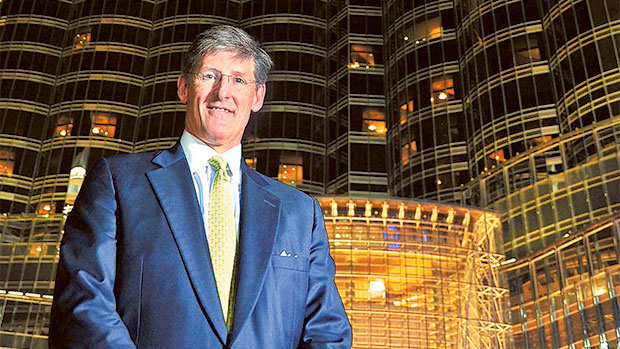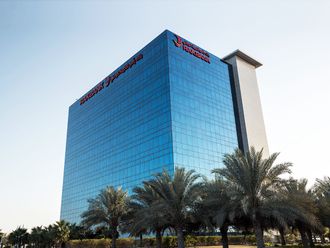
Dubai: The Citi Board of Directors held it meetings in Dubai between 20 and 22 October in line with its practice of holding one meeting outside the US every year. This was also an occasion for the board to witness first hand the progress achieved in the UAE.
Led by Chairman Michael O’Neill, the board held several important external meetings in the UAE and met with key clients. Chairman O’Neill and Chief Executive Officer, Mike Corbat, also called on His Highness Shaikh Mohammad Bin Rashid Al Maktoum, Vice-President and Prime Minister of the UAE and Ruler of Dubai. Corbat and James Cowles, Chief Executive Officer for Europe, Middle East & Africa (Emea) called on Shaikh Mansour Bin Zayed Al Nahyan, Deputy Prime Minister and Minister of Presidential Affairs.
This was the first time the Citi Board have met in the Middle East, and is a reflection of the importance of the region and Citi’s UAE franchise to its global strategy. On the sidelines of the board meetings, Gulf News caught up with Mike Corbat who discussed global themes as well as the importance of the Mena markets, and UAE specifically, to Citi’s global strategy.
Gulf News: Citi has gone through both balance sheet restructuring and operational restructuring following the global financial crisis. How has the crisis changed Citi’s global strategy and footprint?
Mike Corbat: Citi today is simpler, smaller, safer and stronger. We have split the company into Citicorp, which contains our core growth businesses, and Citi Holdings, which contains assets and businesses that are not consistent with our strategy. Citicorp consists of Global Consumer Banking, which focuses on retail clients, and the Institutional Clients Group, which serves our institutional clients around the world. Citi Holdings, which had peaked at more than $700 billion (Dh2.5 trillion) and 40 per cent of total assets, has since shed 60 businesses and some $600 billion assets. It now constitutes only 5 per cent of Citi’s balance sheet. Our execution priorities include improving the efficiency of our core Citicorp franchise, while continuing to wind down our legacy portfolio in Citi Holdings. We are making progress on both fronts, as our recently announced third quarter earnings demonstrate. Citi’s strategy is built around what we’ve identified as the three defining secular global trends of our time: globalisation, urbanisation and digitisation.
With a physical network across 100 countries and our deep, longstanding presence in emerging markets, globalisation plays to our strengths.
As the world continues to urbanise, we are focused on the world‘s top 100 cities and supporting the aspirations of their residents.
New technologies have created new opportunities to serve our customers more efficiently through simple solutions, reducing the reliance on physical branches, and also reducing friction and costs for our institutional clients.
We’re continuing to simplify our company and allocate our ample, but finite, resources to the businesses and countries where we see the greatest opportunities for our clients, such as the UAE. We view the UAE as a market with significant growth opportunities for both our consumer and institutional businesses.
GN: One of the main concerns of bankers in the post-crisis era has been the rising regulatory activism across the world. Are you concerned about the barrage of new regulations and the rising cost of compliance?
MC: We have been strong proponents of legislative and regulatory financial reform. A safer banking system benefits everyone, including Citi and our customers. Banks are adjusting to higher capital ratios, limits on what counts as capital and much stricter liquidity rules. We’ve changed the way we operate and the way we manage our capital. We also know that this wave of regulation remains ongoing and some further adjustments on our part will likely be required.We are concerned about inconsistencies in regulations in the various countries and regions around the world where we do business. We are working with policy makers around the world to harmonise regulations and minimise inconsistencies.
GN: The Fed’s Comprehensive Capital Analysis and Review (CCAR) last year objected to some of your plans relating to share re-purchase. In the face of this, what are your alternate plans?
MC: Getting CCAR right in 2015 is one of our top priorities and we are working to address each of the concerns raised by the Federal Reserve. Most important, our capital planning process is being fully embedded in the way we run the firm. This means everything from increased business engagement and enhancements to our forecasting models and scenario design processes, all of which lead to an improved approach to risk and controls. This work will continue as we get closer to receiving the 2015 stress test scenario from the Fed, at which point we will prepare a strong submission that reflects the work we have done.
GN: Mena region hosts a number of fast growing emerging markets. What are Citi’s perspectives on the Mena region and opportunities for growth given geopolitical challenges, and which are the areas of focus for Citi?
MC: Given its hydrocarbon resources and sovereign wealth, we believe Mena, and specifically the GCC region, will continue to experience healthy GDP growth for many years to come. As a result, we feel there are considerable opportunities for both our institutional and our consumer businesses. International companies are increasingly using the UAE as a hub not only for their Middle East businesses, but also their operations in Africa and elsewhere around the region. Additionally, as Mena-based companies expand around the region and around the world, Citi’s global network and product suite becomes more relevant for them. We conduct business in 16 countries in Mena and we are the leading provider of cash management, treasury, and trade solutions in the region.The UAE also represents an attractive market for personal banking business because of its urban, international and tech-savvy population, which makes it an ideal fit for Citi’s wealth management proposition serving consumer as well as private banking clients.
GN: Where does Egypt fall in your Mena strategy following the recent announcement on exiting banking services in the country?
MC: Consistent with focussing our resources against opportunities where we have a competitive advantage, we have announced our intention to exit our consumer businesses in 11 markets, including Egypt. That doesn’t mean Egypt is not an important market to us, far from it. We will continue to have a presence on the ground to support our institutional clients doing business in Egypt. With our global network and institutional product expertise, we feel we have a competitive advantage in serving our institutional clients operating in Egypt.
GN: The UAE is one of the regional economies that recovered fast from the impact of global financial crisis. While the optimism is on the rise, corporate and government related entities are looking for funding to capitalise on new opportunities. How is Citi planning to help the financing needs of UAE companies?
MC: As our UAE-based corporate clients continue to expand internationally, they are increasingly able to benefit from Citi’s global network, international expertise and our ability to take them to the international capital markets. This year we raised Tier-1 capital for Emirates NBD, Shari’a-Compliant Tier-1 Capital for Al Hilal Bank and convertible bonds for DP World, while last year we lead the GDR listing for Damac Properties on the London Stock Exchange.
We are particularly proud to have developed the first toll road financing in Mena for Dubai’s Salik toll-collection system, and to have lead several firsts in Dubai including the debut capital markets offering for the Investment Corporation of Dubai, the innovative Emirates Airlines Sukuk and the Jebel Ali Free Zone Refinancing.
We are also supporting the SME (Small and Medium Enterprises) and MME sectors, which form the foundations of UAE’s vibrant economy. Our commercial clients are growing at double digit rates, and we are working closely with them to provide lending solutions to support UAE’s economic and social development.
Going forward, we continue to be very supportive of our UAE franchise and expect to be an important part of the future economic growth in the country.












